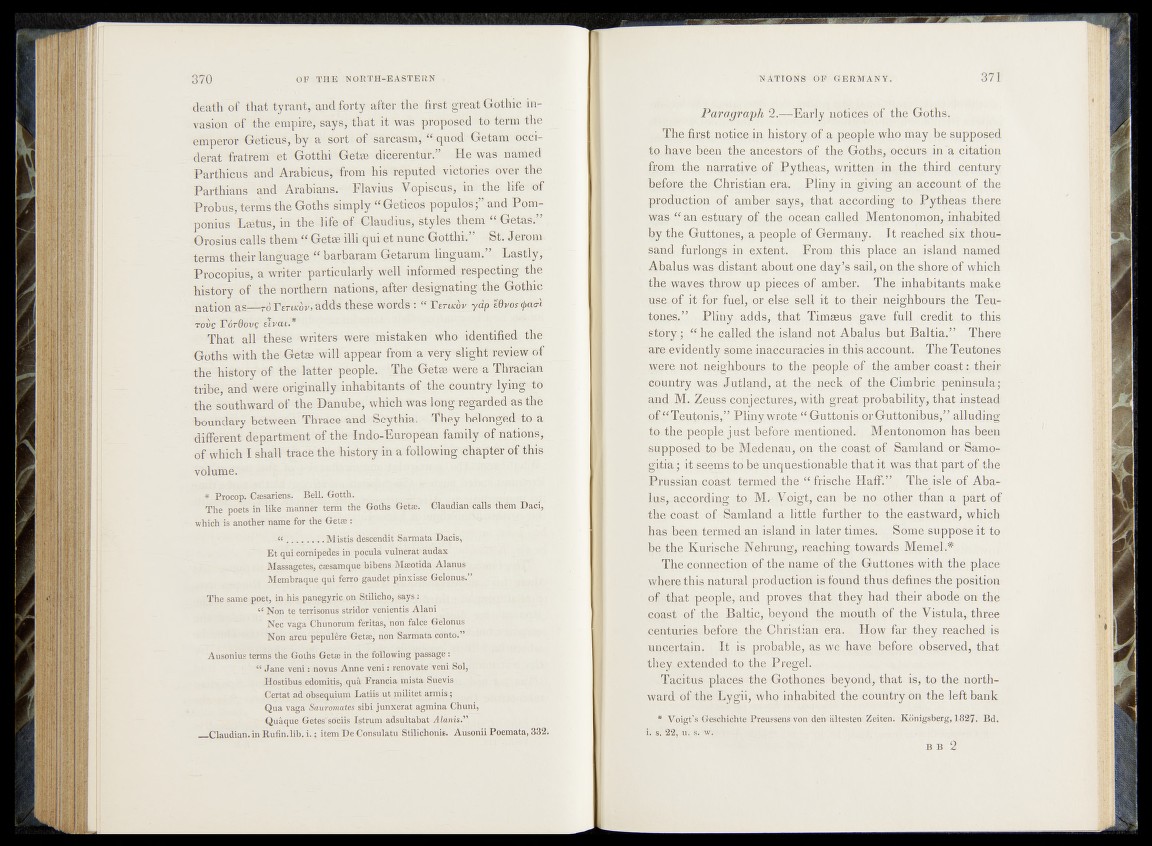
death of that tyraföt, andiprty after the first gfeafc Gothic invasion
of the empire, says, that it was proposed to term the
emperor Gètiens, by a sort of sarcasm,““ quo’d Getam ècci-
derat fratrem et Gotthi Getæ dicefentür.” He was named
Parthicus and Arabicusi, from his'reputed victories over the
Parthians and Arabians. - F]avfàs< Vopiseùs, in the life-of
Probus, terms the Goths simply “ Geti'cos populosf and Pom-
pbriius Lmtiis, in the life of • Claud iusj styles them - Getasv: ,
Orosius calls them “ Getæ illi qui et nunc Gotthi.” v§t* J erom«,
terms their language “ barbaram Getarum linguam.” Lastly,
Procopius, a writer: particularly well informed respecting.'fhfe
history of the northern nations, after designating the Gothic
n a t i o n a d d s thèse words': | tQvostyqo-i
rôvç TôtQovç elvat.*
That all these writers were mistaken who identified the
Goths with the Getæ will appear from a-very ^light review of
the history of the^ latter people. The Getæ-WÉ^ a Thracian
tribe, and were originallÿdnhabitants of-the reountry8 tyfögigfi&
the southward of the Danube, which was long regarded as
boundary between Thrace and Scythia. Æhëy b e lo n g e d ^ !
different department of the Tndo-Earopean family of nafidris;
of which I shall trace the history in a following chapter of this
volume.
* Procopi Cæsariens. Bell, Grotth.
The poets in like manner terra the Goths Getæ. Glaudian calls ÖïêratDaci,
which is another name for the Getæ :
. .Mistis descendit Sarmata Dads,
E t qui comipedes in pocula vulnerataudax
Massagetes, cæsamque hihens Mæotida Alanus
Memhraque qui ferro gaudet pinxisse Gelonus.’’ .
The same poet, in his panegyric on Stilicho, says :
__“ Non te terrisonus stridor yenientis Alani
' ‘ Nec vaga Chunorum feritas, non falce Gelonus
Non areu pèpülêre Getæ, non Sarmata conto.” * *
Ausonius terms the Goths Getæ in the following passage :
u Jane veni : novus Anne veni : renovate veni Sol,
Hostibus edomitis, quà- Francia mista Suevis ,
Certat ad obgequium Latiis pt pjilitet armis ;
Qua vaga Sauromdtes sibi junxerat agmina Chupi,
Quâque Getes'sdciis Istrum adsultabat A la n is .”
__Claudian. in B.ufiri.lih. i. ; Item De Consulatu Stilichoms. Âùsonii Poëmata, 332.
Paragraph 2.—Early notices of the Goths.
,,, TheLfirsb notice, in hisjtor^ qf a people who may be supposed
tp have been the apeestges^of the Gptbs^occurs in "a citation
fropi the narrative# o,f Pytheas, written in the third century
before, thgi Christian era. Pliny in giykig .an account of the
production of amber, sa^s^th^f^ape^diug- to Pytheas there
was “ an. estuary o;f the peeap,galled, Mentonomon, inbabited
by the Guttongg, a peppljesof Germany. It reached six thou-^
sand furlongs, jn. ^ ten f,.| Epofp. thisj^lace anijaland named
Abalus. jwas%distantY^bgugpfm d ^ f e sail, on the.sboippf which
th e .w^.vqs, tbaow, up ^iecMaaf^ainJbed’. (T,he^ ifaiits make
^ p ^ q f.filj.fprj'fuel. or else,,sell ifj ^o;|^eip,.neighbours.,the Teun
•tjipei” Pliny, adds, that Timaeuslkpp^-^ill. credit, to .this
n° t Abal q^-ibjUt.Bal tia, ’ ’ There
are evidently same jnac.curapiesin ;th|^acc|q|inj::; The Teutpnes
.W^e^.npt neighbours to the^ppople^pf^ the ,amj3.eF ebp,s,fc: their
country,.was Jutland, at$.fh£r peek, of Jfbp-pif^bj$p*peninsnl,aj
and M. ^enss^conjectnpe&.'iyitb i»ea^,proba.bili^fcthat instead
pf “ Teu^oni.s,” PlinyvWf#te4^G,uttpid,^i^etk©nibus,” .alluding
tp the.,pe@tple, j usb'befprp1 mentioned.! j M^^qnornp® basbeen
supposed to be AJ^enau^qn themoast o f £umland qqfcsaijiq^
g k ia ; i be bnq ue^ti onablpjttetpfe^as t|iat partysfithe
Prussian co^st.^termpd the “ frische Haff.” The is l^ jf AbaV:
lus^according fo. M b e , ; 'a P art °f
-tbe coast’?of Samland a little further-to the.eagt^agd'i which
has been termed an. ishmd in later .times, Oppose dp to
be the Kiirisc.heirfpehrup ^ reyhing, towards Metnel-.*
The connection of the name, ofdhg,(^u|fe||^with the place
where this natural productjpriii'^found thu^defoies the ppsitiou
of, ithat people, .and t prqfb^l jtthat they had', their abode ©a' the
coast of the Baltip, Jaeyond^j^M mouth, ,qfyh h e |^ ^ 4 a^ jlh re e
■centuries.,.beforejifce^jQbjlsfian How./ar t^tey .rpaqhed is
uncertain. It, is, :BrqbabJ,es r hav^^before...ob&qrved. that
tliey extended-to the H^egel.-^
Tacitus places thefQ.Qtheneg^beyQnd, that, is^ip the-np5^ 1“
ward of the Lygii, whq in h a b it^ ;tHe*ölbätoy on 'the■ left hanfe
* Voigt’s Geschichte Preussens von den ältesten Zeiten.;Königsberg, 1827. Bd.
i. s: 22, u.- s. 'W.